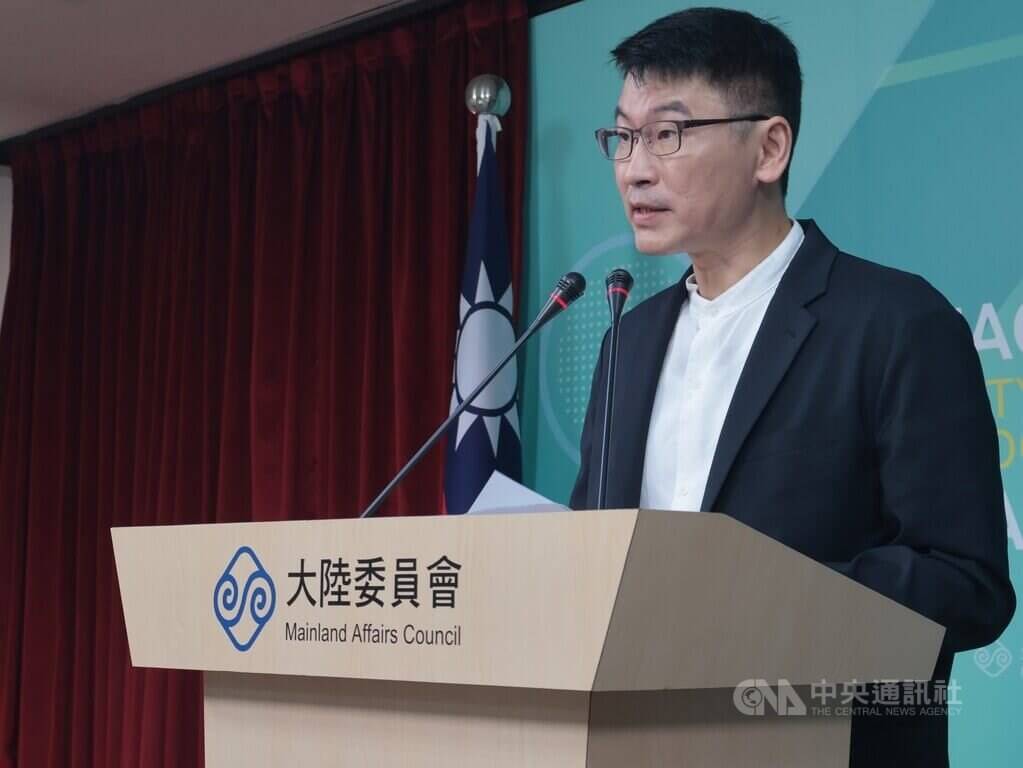The Mainland Affairs Council (MAC) yesterday announced a ban on all current and former government officials from traveling to China to attend a military parade on Sept. 3, which Beijing is to hold to mark the 80th anniversary of the end of the Second Sino-Japanese War.
"This year marks the 80th anniversary of the end of World War II and the Republic of China’s victory in the War of Resistance [Against Japan]," MAC Deputy Minister and spokesperson Liang Wen-chieh (梁文傑) told a regular news briefing in Taipei.
To prevent Beijing from using the Sept. 3 military parade and related events for "united front efforts targeting Taiwan," Liang said the government has prohibited central and local government officials from attending the parade or related activities organized by Chinese authorities.

Photo: CNA
Personnel at all levels of government, including those in subordinate agencies, are also barred from attending, the council said in a news release.
The ban also applies to former deputy heads or higher-level officials of agencies responsible for national defense, foreign affairs, mainland affairs or national security, as well as military officers ranked major general or above and heads of intelligence agencies, Liang added.
If former officials violate the ban, they would be subject to penalties such as fines or the suspension or revocation of pensions, as stipulated in relevant provisions of the Act Governing Relations Between the People of the Taiwan Area and the Mainland Area (臺灣地區與大陸地區人民關係條例), he said.
Liang also urged the public not to take part in the Sept. 3 parade in Beijing or any related events in China, while noting that under current regulations, ordinary members of the public are not prohibited from attending.
However, he said that if any political party, legal entity, civic group or individual travels to China to participate and engages in any form of cooperative activity with Chinese authorities, they would be subject to penalties under the cross-strait act and other relevant laws.
Those cooperative activities could include "signing agreements or memorandums, issuing joint statements or taking part in promotional campaigns," Liang added.
Asked if any government officials had applied to attend events in China marking the 80th anniversary of the end of the Second Sino-Japanese War before yesterday's announcement, Liang said there were "a few scattered cases."
"Some are still under review, while others have been rejected," he added.
China’s state-run Xinhua News Agency on June 25 reported that a military parade would be held in Beijing’s Tiananmen Square on Sept. 3 to "mark the 80th anniversary of the victory in the Chinese People’s War of Resistance Against Japanese Aggression and the World Anti-Fascist War."
Chinese President Xi Jinping (習近平) is to "review the troops and address a grand gathering held that day to mark the anniversary," according to the Xinhua report.

US President Donald Trump said "it’s up to" Chinese President Xi Jinping (習近平) what China does on Taiwan, but that he would be "very unhappy" with a change in the "status quo," the New York Times said in an interview published yesterday. Xi "considers it to be a part of China, and that’s up to him what he’s going to be doing," Trump told the newspaper on Wednesday. "But I’ve expressed to him that I would be very unhappy if he did that, and I don’t think he’ll do that," he added. "I hope he doesn’t do that." Trump made the comments in

NOT AN OPENING: Trump’s violation of international law does not affect China’s consideration in attacking Taiwan; Beijing lacks capability, not precedent, an official said Taiwanese officials see the US’ capture of the president of Venezuela as a powerful deterrent to Beijing’s aggression and a timely reminder of the US’ ability to defeat militaries equipped with Chinese-made weapons. The strikes that toppled Venezuelan President Nicolas Maduro signaled to authoritarian leaders, including Chinese President Xi Jinping (習近平), US President Donald Trump’s willingness to use military might for international affairs core to US interests, one senior official in Taipei’s security circle said. That reassured Taiwan, the person said. Taipei has also dismissed the idea that Trump’s apparent violation of international law could embolden Beijing, said the official, who was not

A cold surge advisory was today issued for 18 cities and counties across Taiwan, with temperatures of below 10°C forecast during the day and into tonight, the Central Weather Administration (CWA) said. New Taipei City, Taipei, Taoyuan and Hsinchu, Miaoli and Yilan counties are expected to experience sustained temperatures of 10°C or lower, the CWA said. Temperatures are likely to temporarily drop below 10°C in most other areas, except Taitung, Pingtung, Penghu and Lienchiang (Matsu) counties, CWA data showed. The cold weather is being caused by a strong continental cold air mass, combined with radiative cooling, a process in which heat escapes from

Snow this morning fell on Alishan for the first time in seven years, as a strong continental cold air mass sent temperatures plunging across Taiwan, the Central Weather Administration (CWA) said. The Alishan weather station, located at an elevation of about 2,200m in central Taiwan, recorded snowfall from 8:55am to 9:15am, when the temperature dropped to about 1°C, the CWA said. With increased moisture and low temperatures in the high-altitude Alishan area, the conditions were favorable for snow, CWA forecaster Tsai Yi-chi (蔡伊其) said. The last time snow fell at the Alishan weather station was on Jan. 10, 2018, while graupel fell there